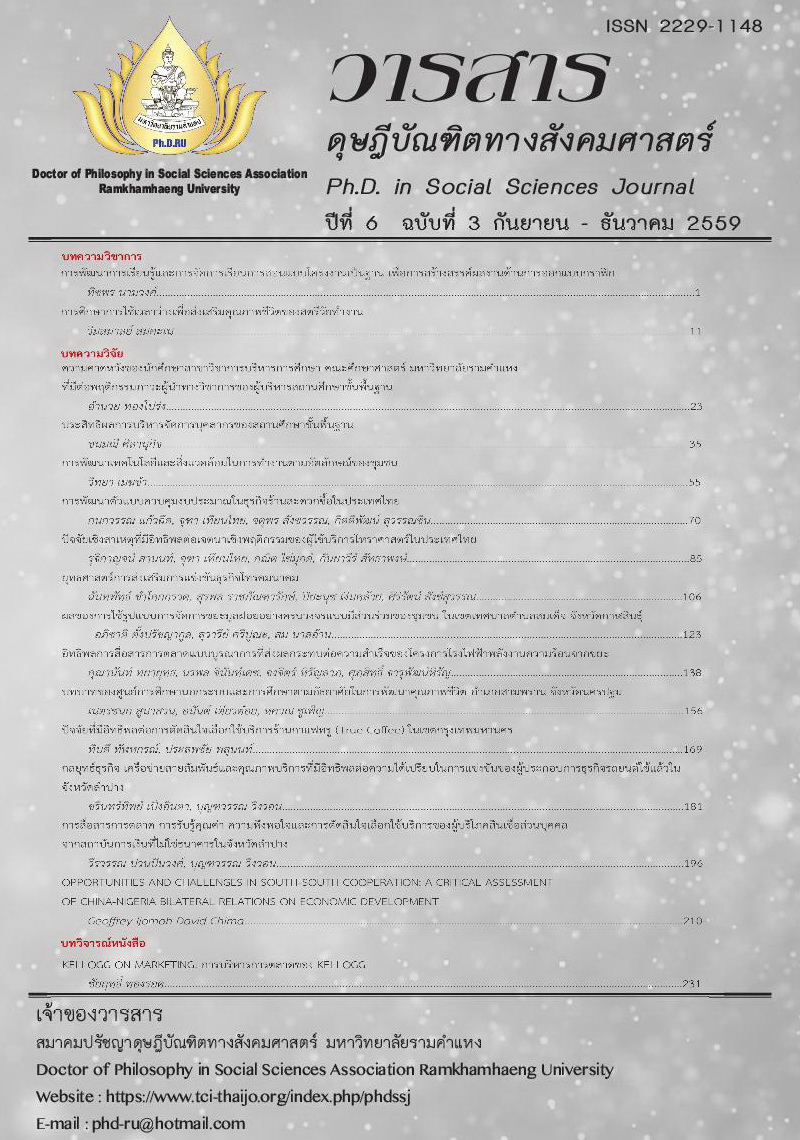ยุทธศาสตร์การส่งเสริมการแข่งขันกิจการโทรคมนาคม
Main Article Content
Abstract
การวิจัยครั้งนี้มีวัตถุประสงค์เพื่อ (1) ศึกษาการดำเนินกิจการโทรคมนาคม และการแข่งขันในกิจการโทรคมนาคม (2) ศึกษาปัญหาอุปสรรคของการส่งเสริมการแข่งขันในกิจการโทรคมนาคม และ (3) เสนอแนวทางที่เหมาะสมของนโยบายการส่งเสริมการแข่งขันในกิจการโทรคมนาคม
ผลการวิจัยพบว่า
1. กสทช. ตั้งขึ้นโดยกฎหมาย ซึ่งกำหนดให้มี 2 หน่วยงานย่อย คือ คณะกรรมการกิจการกระจายเสียงและกิจการโทรทัศน์ (กสช.) และคณะกรรมการกิจการโทรคมนาคม (กทค.) และสำนักงาน กสทช. ได้จัดโครงสร้างองค์กรภายในให้สอดคล้องกับข้อกำหนดกฎหมายดังกล่าว แต่การบริหารงานขาดประสิทธิภาพไม่คล่องตัว ไม่ทันต่อการเปลี่ยนแปลงของเทคโนโลยีที่มีการเปลี่ยนแปลงอย่างรวดเร็ว
2. ปัญหาและอุปสรรคส่วนใหญ่ ซึ่งเกิดจากการดำเนินการที่ภาครัฐขาดความชำนาญหรือความถนัด และขาดความสนใจในเรื่อง การบริการที่สร้างความพึงพอใจแก่ลูกค้ามากกว่าการทำตามหน้าที่ตามที่กฎหมายกำหนด ส่วนแนวทางที่เหมาะสมของยุทธศาสตร์การส่งเสริมการแข่งขันในกิจการโทรคมนาคม ภาครัฐควรจะดำเนินการแต่ในสิ่งที่ตนถนัด การดำเนินการที่ต้องใช้ ความชำนาญเฉพาะควรให้เอกชนผู้มีความเชี่ยวชาญเข้าร่วมงานกับรัฐ
3. ข้อเสนอแนะ ควรมีการเน้นการเพิ่มขีดความสามารถทางด้านการแข่งขันทั้งบุคคล องค์กร และประเทศ ลดความได้เปรียบเสียเปรียบในการแข่งขัน และการพัฒนานวัตกรรมใหม่ๆ ให้ทันการเปลี่ยนแปลง การกำหนดนโยบายการส่งเสริมการแข่งขันในกิจการโทรคมนาคม ควรมีลักษณะที่เป็นการเปิดโอกาสให้ทุกส่วนได้เข้ามามีส่วนร่วมในการกำหนดแนวทางการส่งเสริมการแข่งขันอย่างเสรีและเป็นธรรมเพื่อให้ผู้บริโภคได้รับประโยชน์สูงสุด ควรแก้ไขปรับปรุงการวิธีการจัดสรรคลื่นความถี่ในกิจการโทรคมนาคมให้สามารถใช้วิธีการต่างๆ ได้อย่างเหมาะสม
COMPETITION PROMOTION STRATEGIES IN THE TELECOMMUNICATION BUSINESS
In this research, the objectives of the researcher are threefold: (1) to study the operations of the telecommunication business in the light of competition. (2) to examine obstacles and problems encountered in promoting competition in the telecommunication business. (3) to present appropriate guidelines for a competition promotion policy as applied to the telecommunication business.
Findings are as follows:
1. The National Broadcasting and Telecommunication Commission (NBTC) was established by law and is divided into two sub-agencies. These sub-agencies are the Broadcasting and Television Commission (BTC) and the National Telecommunications Commission of NBTC (NTC). The internal structure of the NBTC Office is organized in accordance with legal regulations. However, the administration is inefficient, inflexible, and is outdated since it has not adapted to the rapidity with which technology has changed. This is because structural changes must adhere to legal requirements. The administration of the NBTC Office vis-à-vis telecommunications falls under the NBTC’s telecommunications policy and model. Policy is grounded in a top down model with vertical control exercised by executives. As such, the administration is unresponsive, militates against finding solutions to problems.
2. Problems and obstacles mainly occur because operations are controlled by a public sector organization devoid of expertise and requisite skills. The executives fail to show interest in services that would satisfy customers. Concerning guidelines promoting appropriate competition strategies in the telecommunications business, the public sector should restrict itself to operations in which it is competent. Concessions should be granted only to those organizations which have specialized technical expertise in telecommunications.
3. The actualization of competitive potentialities should be increased at the individual, organizational, and national levels. The weighting of competitive advantages and disadvantages should be mitigated. Innovation should be promoted such that changes can be incorporated by those in the telecommunication business. Telecommunications business entrepreneurs should be protected and their rights should be specified. Improvements should be made in the method of assigning frequencies in the telecommunications business so that various methods can be used as contextually appropriate.
Article Details
Academic articles, research articles, and book reviews in the Ph.D. in Social Sciences Journal are author’s opinions, and not the publisher’s, and is not the responsibility of the Ph.D. in Social Sciences Journal Philosophy Association, Ramkhamhaeng University. (In the case that research is done on human, the researcher has to be trained in Ethics for Doing Research on Human Training and has to produce the evidence of the training).


